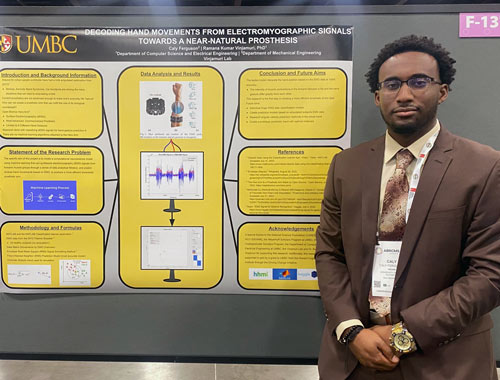Caly is a junior, majoring in Mechanical Engineering. He is a Meyerhoff Scholar, URISE Trainee, and HHMI Scholar.
Title of your research project:
Decoding Hand Movements From Healthy Electromyographic Signals Toward A Transferable Near-Natural Prosthesis.
Describe your project:
The specific objective of this project is to create a computational neuroscience model using machine learning that can synthesize non-amputated individuals’ muscle signals from forearm muscle groups, and predict diverse hand movements based on these signals as a transferable method of predicting amputated individuals’ desired hand movements. After successfully creating the software foundation, we plan to apply it to a 3D-printed prosthetic arm as a proof of concept to show how the system works in a real-life application.
Who is your mentor(s) for your project?
My project mentor is Dr. Ramana Kumar Vinjamuri from the Department of Computer Science and Electrical Engineering. I found my mentor through the Meyerhoff HHMI Scholars program, which allowed me to start rotating in different research labs on campus during my freshman year of college.

How did you become interested in this project?
Going into college, I set a goal for myself to build a working prosthetic before I graduate, due to my long-time interest in enhancing technology in the medical field. To do this I looked for a specific lab that would help me achieve this goal, and Dr. Vinjamuri’s lab was the best environment for me to pursue my goal. Even though my idea for a project when first starting was a bit different from the larger theme of the lab, he helped direct my project to fuse elements of the work that was being done in the lab with my personal goals so that I could further the knowledge in my field of work while achieving my four-year plan.
What has been the hardest part about your research/what was the most unexpected thing about being a researcher?
The hardest part about my research is learning all of the computer science skills that go into creating a machine learning algorithm that aims to apply that as a base software for a device. Since I am a Mechanical Engineering major, I do not take a lot of coding classes, so over the years I have built those skills from the ground up through my experience working on this project.
What has been the most rewarding part?
The most rewarding part of my research has been sharing my results with others at big conferences, where I can walk people through the progression of my learning and progress on my project. As time goes on and I attend more conferences, I can see the end goal that I set for myself in freshman year becoming more and more of a reality!
How will you disseminate your research?
This academic year I have planned to attend the Biomedical Engineering Society Annual Meeting in October and the Undergraduate Research and Creative Achievement Day at UMBC in the Spring.
What is your advice to other students about getting involved in research?
My advice is for students to try different research experiences while they are in undergrad, whether it be through sustained research or summer research experiences so that they have a better understanding of what they do and don't like about lab environments, project development, and other things that are helpful to know before applying to graduate school.
What are your career goals?
My career goal is to earn a PhD in Biomedical Engineering so that I can start and run a Biotechnology company that manufactures advanced and affordable medical devices. I also have aspirations of running a research lab as a principal investigator.